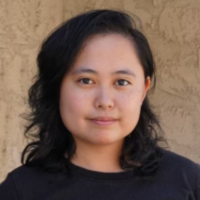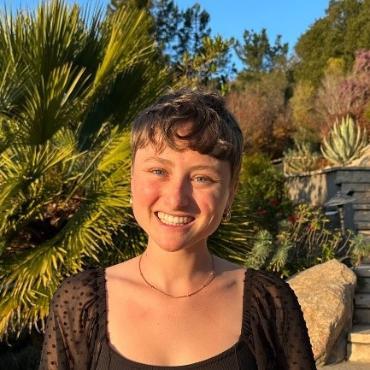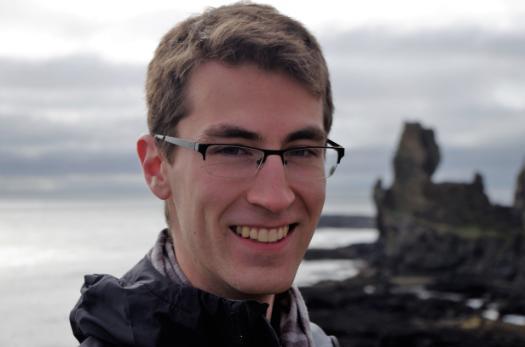
Featured Alumni
Zeena Rivera
Graduated: 2018, BS in Psychology and BA in Humanities
Additional Degrees: Neuroscience PhD Candidate, UCLA
Zeena Rivera (they/them), is a neuroscientist studying how animals value novel experiences. Zeena uses a combination of chemogenetic tools during freely moving tasks in rats. They are also passionate about designing ethologically relevant behavioral tasks to probe questions regarding reward, learning, and memory.
-
Read More About Zeena Rivera
-
Zeena Rivera, a 2018 graduate with a BS in Psychology and BA in Humanities for Leadership, has recently been selected as a Howard Hughes Medical Institute (HHMI) Gilliam Fellow where HHMI has a long history of funding high impact and exciting science. The goals of the Gilliam program are to ensure that students from groups historically excluded from and underrepresented in science are prepared to assume leadership roles in science and science education, and to also promote the development of a healthier, more inclusive academic scientific ecosystem by partnering with institutions and faculty that are committed to advancing diversity and inclusion in the sciences. Zeena is currently attending UCLA where they are earning their PhD in Neuroscience. They also work as a Graduate Student Researcher at Izquierdo & Wikenheiser Labs where they investigated frontal and perirhinal cortex modulation of reward-guided behavior using a combination of retrograde and anterograde viral vectors and behavior as well as troubleshooted UCLA Miniscope implementation in novel rat models. A further summary of Zeena's work can be found below:
"The perirhinal cortex (PRh), constituting Brodmann’s areas 35 and 36, is a structure at the intersection of visual perception and memory formation [1] . PRh receives inputs from secondary visual areas as well as other cortical and subcortical regions, indicating that it likely has a role beyond simple visual object discrimination [2] . Specifically PRh has shown to process information necessary for more complex functions such as to resolve feature ambiguity [3] , recognize objects-in-space [4, 5] , discriminate novel objects from familiar ones [6] , learn object values [7] , and provide a reward context for objects and stimuli [8, 9] . PRh, and sectors of the prefrontal cortex (PFC), including the orbitofrontal cortex (OFC) and anterior cingulate cortex (ACC), have all been implicated in flexible cue-based reversal learning in rodents [10] and nonhuman primates [11,12,13] These are important functions since objects (or cues) in the real world are frequently associated with differing reward values" (Rivera).
Jennifer Cruz-1-200x200.jpg)
Graduated: 2016, BS Psychology
Additional Degrees: Master of Public Health in Global Health Epidemiology, University of Michigan School of Public Health
Population Health Sciences PhD candidate, Department of Social and Behavioral Sciences at Harvard T.H. Chan School of Public Health
Jen Cruz (she/her) graduated from Seattle U’s Psychology department in 2016 with her Bachelor of Science. She then moved to New Delhi, India as a Fulbright-Nehru Student Researcher and Critical Language Enhancement Award recipient.
-
Read More About Jennifer Cruz
-
Jen Cruz (she/her) graduated from Seattle U’s Psychology department in 2016 with her Bachelor of Science. She then moved to New Delhi, India as a Fulbright-Nehru Student Researcher and Critical Language Enhancement Award recipient. During her time in the Fulbright program, Jen conducted a mixed-methods study investigating perceived barriers to care, attitudes towards the HPV vaccine, stigma associated with cervical cancer, and health literacy. She went on to earn her Master of Public Health in Global Health Epidemiology from the University of Michigan’s School of Public Health in 2020. Drawing from her previous training in Psychology, Jen used Social Cognitive Theory to guide her analysis on shifts in predictors of acceptance of domestic violence among young, unmarried women in India. During her time at Michigan, Jen was involved in research at the Center for Social Epidemiology and Population Health and the Center for Sexuality and Health Disparities which further solidified her research interests in social epidemiology, health equity, and community-based research.
Currently, Jen is a Population Health Sciences PhD candidate in the Department of Social and Behavioral Sciences at Harvard T.H. Chan School of Public Health specializing in Applied Social Epidemiology. She is a predoctoral fellow at the Harvard/Dana-Farber Cancer Institute Educational Program in Cancer Prevention, a National Institutes of Health T32 grant, as well as a member of the FXB Center for Health & Human Rights PhD & DrPH cohort. Jen’s dissertation is focused on exploring the heterogeneity of rurality in the US to better identify context-specific interventions aimed at addressing persistent breast cancer screening inequities. She also supports research in the Implementation Science Center for Cancer Control Equity and the Ramanadhan Lab as a graduate student research assistant. In addition to her research roles, she serves as a Teaching Fellow for courses in advanced social science and epidemiological methods, qualitative data analysis, and community-based participatory research.
Outside of the institution, Jen is an active member of the Allston-Brighton neighborhood of Boston. She has received the Presidential Public Service Fellowship and Rose Service Learning Fellowship to support her community work with the Allston Brighton Health Collaborative (ABHC)- a local non-profit that convenes a network of local organizations, residents, elected officials, and advocates to improve systems that affect public health and wellbeing. Drawing from her academic training and experience as a community organizer, Jen designed and piloted the Community Health Advocate Mobilization Program (CHAMP). CHAMP is a community-centered public health education program with the primary goal to increase community members’ knowledge, skills, and language that complement their current expertise so that they can advocate for the public health needs of their neighborhood. Starting in 2023 she has also joined the steering committee bringing her experience as a resident and public health professional.
Jen is a first-generation student from Wapato, WA- a small, rural community on the Yakama Reservation that continues to inspire her academic work and organizing efforts. She is also the proud mom of a 10-year-old dachshund-beagle named Maple.
Stella Roth 
Graduated: 2021, BS in Psychology and minor in Sociology
Additional Degrees: MPH, Department of Epidemiology Candidate, Columbia University
The holistic curriculum taught through the Psychology department at Seattle University provided me with the opportunity to explore a broad range of topics in the psychology field, while also creating space to investigate my specific interests in public health. The research and analytical skills that I built through the statistics, research methods, and practicum courses prepared me to succeed in my MPH at Columbia by being an independent thinker who is dedicated to creating meaning and social change through research.
Ian Hojnosz
Graduated: 2017, BS in Psychology
Additional Degrees: MS Social Psychology, The University of Edinburgh
PhD candidate Psychology, The University of Edinburgh
I (he/him) am a quantitative social psychology researcher and analyst. I've spent the past 7 years of my career finding and bridging the gaps between crossing streams: big numbers & real people, the doers & the thinkers, troves of information & finite attention.
-
Read More About Ian Hajnosz
-
As a scholar, my research has always circled a central thread; what does it mean to truly connect? Our relationships with each other are perhaps the most important and special things we do as human beings, but how and why do they matter so much to us? Currently, I study at the University of Edinburgh where my PhD focuses on the emotion of feeling "moved" or "touched", and what it means for bringing people together. I've presented my research at international conferences and recently awarded Highly Commended (Runner-Up) for Best Small Data-Driven Project by the Centre for Data, Culture and Society. My teaching in statistics has also been recognized with a Tutor Excellence Award in 2021/2022 and recently nominated for Student Tutor of the Year 2022/2023.
A common theme throughout my work is grappling with not just how to form a question and a way to answer it, but to understand the framing behind it. To this end, I rely heavily on the statistics and research methods training I got from the 3030/3050 and 4030 courses. Additionally, the critical thinking skills that the SU Psychology Department so often emphasizes throughout their curriculum help me think creatively, synthesize different viewpoints, look to the big picture, and ask why it all matters. For me, this background of research methods and critical thinking has not only opened doors but also allowed me to walk through them with competence and confidence.